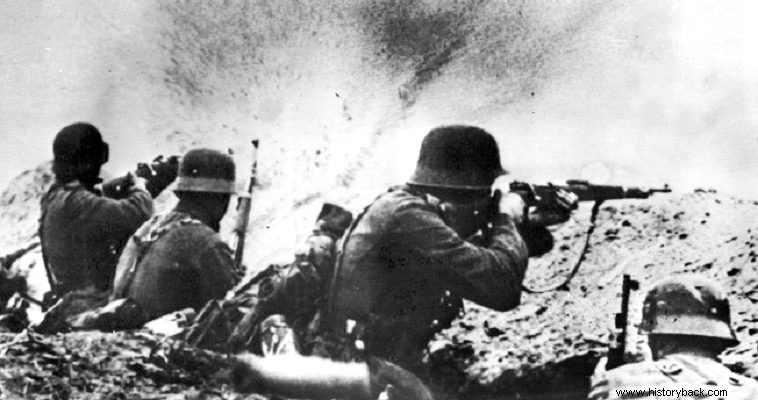
Just four days after launching their attack on Berlin on April 20, 1945, the Soviets had split the German front north and south of the city and were rapidly encircling the city. The German forces were no longer in a position to challenge, not even for a moment, the supremacy of the Soviets. But there was someone who categorically refused to see reality. It was Adolf Hitler.
On the morning of April 20, the telephone rang hauntingly in the call center of Hitler's underground bunker. The scumbag General Krebs chief of staff of the Supreme Army Command (OKI), he was constantly receiving bad news. General Heinrich, the head of the armies defending Berlin (Army Group Vistula), was in constant communication with Krebs asking him to persuade Hitler to approve the retreat of the Ninth Army, which had been torn apart by the Soviet offensive, to new positions closer to Berlin.
His request, however, was refused and Hitler, through Krebs, asked the commander of the 9th Army, General Busse, to hold his positions, covering "somehow" both of his exposed wings and his rear .
On the morning of April 21, Hitler was awakened, at 09:30, by the sound of Soviet shells. At 2:30 p.m., the usual midday meeting took place in the bunker (his underground shelter under the chancellery). Apart from Hitler and Krebs, there were also the piper field marshal Keitel and Admiral Dainitz present. The most alarming development, according to Hitler, was the deep advance of the Soviets in the northern sector of the city. The advance of Marshal Koniev's forces from the south did not seem to concern him.
To meet the threat in the northern sector, Hitler single-handedly organized a counter-attack that would drive the Russians back across the Oder. SS General Felix Steiner, head of the "Steiner Army Detachment", took responsibility for the attack. , as, Hitler, called the otherwise non-existent command of the unfortunate general.
Hitler, looking at his map, pointed with his finger and exclaimed:"Steiner, Steiner, Steiner." He calculated that Steiner's forces would flank the advancing forces of Soviet Marshal Zhukov and deal such a blow that they would be forced into a disorderly retreat.
At the same time, on the southern front of the city, the encircled 9th Army was ordered to attack and "destroy Koniev's armored forces, which were in its rear". Whether this could be done was, of course, of no concern to him. He could, after all, just as easily order the occupation of the Moon. In Hitler's mind there were no obstacles. Willpower could overcome all!
Nevertheless, the infamous "Steiner attack", personally, as it was said, inspired by the "Führer", not only had no hope of success, it was not even possible to manifest. According to Hitler, Steiner had five Grenadier Panzer Divisions (motorized), while his attack would be supported by the Luftwaffe and all available artillery.
Steiner, however, never had five divisions, he only had three and they were half-dissolved. His most battle-worthy divisions, the Waffen SS Nordland division and the Waffen SS Nederland division, had been allocated to the collapsing 9th Army. Another two divisions he had allocated to the 3rd Panzer Army to deal with the threat to its right flank from Zhukov's advance. What he was left with was a jumble of men of every age and origin, armed with every weapon available, from anti-tank punches to Italian sub-machine guns, with minimal machine guns, no artillery, no tanks and of course, no prospect of Luftwaffe support.
Hitler, by his order, which he sent at 16.50 on April 21 to Steiner himself, made him responsible for the execution of the attack. The penalty for improper execution was death. "The fate of the German capital depends on the success of your mission," it read. Immediately Steiner called Krebs, explained the situation and told him that he simply didn't even have the troops to attack with. Then Hitler grabbed the receiver and said to the embarrassed general:"You'll see Steiner, you'll see. The Russians will suffer their greatest defeat in front of the gates of Berlin." “I told him,” says Steiner, “that I consider the situation hopeless. He ignored me". A little later the written order came.
Hitler also avoided informing Heinrich of his decision, apparently knowing that the general would attempt to bring him back to reality. Steiner himself stated in 1948:“I had nothing to attack with it. The three reserve divisions (4th SS, 25th Grenadier and 5th Chasseurs) placed under my command at Sorfeide had also been ordered to support the desperate 3rd Panzer Army and had been engaged in a futile attempt to stop the Russian advance towards the west.
“The two new divisions that were promised to me never arrived. I refused to involve this jumble of untrained men. I didn't want to lose my soldiers in an operation doomed to failure from the start. The plan of attack was based on facts that were no longer valid, only in the imagination of the chancellery".
The next day Hitler got up at 09.00. Immediately afterwards he asked to be informed about the progress of Steiner's attack. But the information was confusing. Word was sent from SS headquarters that the attack had been launched. Instead the Luftwaffe headquarters reported that the attack had not even taken place. In this climate, the meeting on the military situation began at 15.00.
The atmosphere turned somber when the generals touched on the contentious issue of the "Steiner attack." The attack had not even taken place. Despite his "wise" planning, despite his threats against Steiner, the attack never took place. This was a heavy blow to Hitler, who in a rage literally began to scream. For three hours his listeners trembled before his wrath. It was then that Hitler decided to stay in Berlin and kill himself.
